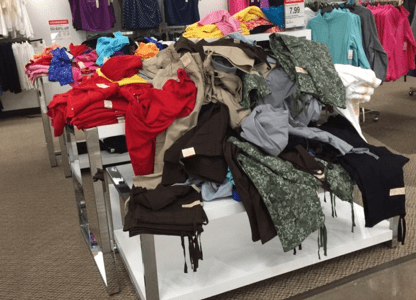Can cleanliness and organization affect how a retail store performs? You better believe it. 2018 was a rough year for several retailers…proving that fact.
Toys R Us closed for good in the United States and was forced to liquidate because it was unable to sustain its debt load after a leveraged buyout in 2005. According to a filing with the bankruptcy court, Toys R Us had still been making $400 million payments on its debt every year.
Department stores, in particular, have been struggling because of declining foot traffic to malls, which has affected Sears, JCPenney, Lord & Taylor, and Macy’s. They all have closed stores in the past year, and Sears filed for Chapter 11 bankruptcy protection after years of declining sales.
The rise of e-commerce has played a huge role in the downfall of some retailers who can’t keep up with Amazon, eBay, Wayfair, etc. Although stores have been working on improving their marketing strategies, it hasn’t always been enough. Even on Black Friday, traditionally one of the biggest shopping days of the year, stores were relatively empty.
Maybe it’s because department stores are focusing on the big picture and not the details. During secret shopper visits to various stores, it was alarming what was discovered. Empty shelves, dirty carpet, displays so crowded you couldn’t sort through the inventory, and empty cash registers with no employees in sight.
Tom Buiocchi, the CEO of facilities management platform ServiceChannel, sees it over and over. Retailers cut back on store maintenance and improvements and end up on the fast track to bankruptcy, while those who invest in store improvements and upkeep are succeeding and expanding.
A study commissioned by ServiceChannel surveyed 1,521 consumers and 70% said they recently had a negative experience with a messy store, ranging from dirty bathrooms and broken toilets, to disorganized shelves and burned-out light bulbs. Over two-thirds said they have walked out of stores because they were messy or disorganized. Four out of five shoppers said they would rather have a clean store than ones with the newest tech, and two-thirds said retailers are forgetting the basics—like clean floors and well-stocked shelves—in the rush to add tech. “The vast majority of purchases are still being done by people walking into a location. And their experience of that location has never been more important,” Buiocchi said in an interview.
With so many other shopping options, retailers must be on top of their game. Consumers want to be rewarded when they make the effort to walk into a store and a dirty, disorganized store says the retailer doesn’t care—about the store or the shopper. Store maintenance used to be considered “a non-sexy part of the business,” Buiocchi said, “but now it directly affects the high expectation for an in-store experience. And facilities managers all have a role at the table now.”
Many of the new online brands that are opening stores are quick to recognize the value of rigorous maintenance and are signing up as customers. “There are the people that get it, and there are the people that don’t get it,” Buiocchi said. “Good progressive retail is investing in their brick-and-mortar experiences and enjoying the benefits of that,” he said. “Bad retail is not and they’re unfortunately being penalized for that.”


Although JCPenney has been struggling the past few years, new CEO Jill Soltau, is up for the task of bringing the stores back to life. Soltau, who took over the position in October, said in a recent earnings call that the department-store chain is failing to adequately deliver on some fundamentals of “good retail.”
On Tuesday, JCPenney reported first-quarter earnings for 2019; same-store sales during the quarter dropped by 5.5%, following a 6% drop in the previous quarter. “I am pleased with the strides we’ve made in setting key objectives, building our senior leadership team, executing significant changes in our assortment, such as eliminating major appliances, and mobilizing the entire organization around our priorities,” Soltau said in a press release on Tuesday. She continued: “JCPenney is an American retail icon that is very important to all of our stakeholders, and I am encouraged by the early signs I am seeing in our business as we work to realize the potential that lies ahead.”JCPenney, and other struggling retailers, are definitely capable of delivering on the fundamentals of great retail. The fate of the company now depends on its ability to execute this shopping experience across its entire fleet.
The problem is consistency. Visits to numerous JCPenney stores across the Southeast proved just that. Stores in Richmond, Virginia featured empty shelves, messy displays, and abandoned cash registers. The stores, which both anchored enclosed shopping malls, felt outdated and far too large. However, a third JCPenney store in a strip mall, revealed flawless design, layout, and presentation. This store obviously cared about presentation, reputation, and customer experience.

